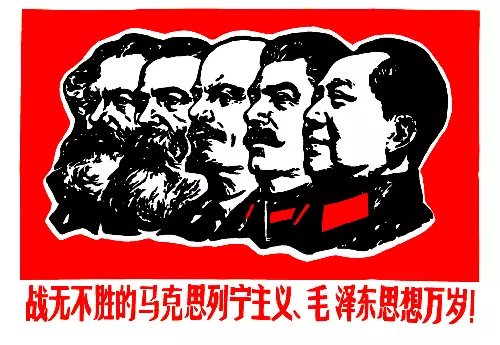view the rest of the comments
Communism
Discussion Community for fellow Marxist-Leninists and other Marxists.
Rules for /c/communism
Rules that visitors must follow to participate. May be used as reasons to report or ban.
- No non-marxists
This subreddit is here to facilitate discussion between marxists.
There are other communities aimed at helping along new communists. This community isn't here to convert naysayers to marxism.
If you are a member of the police, armed forces, or any other part of the repressive state apparatus of capitalist nations, you will be banned.
- No oppressive language
Do not attempt to justify your use of oppressive language.
Doing this will almost assuredly result in a ban. Accept the criticism in a principled manner, edit your post or comment accordingly, and move on, learning from your mistake.
We believe that speech, like everything else, has a class character, and that some speech can be oppressive. This is why speech that is patriarchal, white supremacist, cissupremacist, homophobic, ableist, or otherwise oppressive is banned.
TERF is not a slur.
- No low quality or off-topic posts
Posts that are low-effort or otherwise irrelevant will be removed.
This is not a place to engage in meta-drama or discuss random reactionaries on lemmy or anywhere else.
This includes memes and circlejerking.
This includes most images, such as random books or memorabilia you found.
We ask that amerikan posters refrain from posting about US bourgeois politics. The rest of the world really doesn’t care that much.
- No basic questions about marxism
Posts asking entry-level questions will be removed.
Questions like “What is Maoism?” or “Why do Stalinists believe what they do?” will be removed, as they are not the focus on this forum.
- No sectarianism
Marxists of all tendencies are welcome here.
Refrain from sectarianism, defined here as unprincipled criticism. Posts trash-talking a certain tendency or marxist figure will be removed. Circlejerking, throwing insults around, and other pettiness is unacceptable.
If criticisms must be made, make them in a principled manner, applying Marxist analysis.
The goal of this subreddit is the accretion of theory and knowledge and the promotion of quality discussion and criticism.
Check out ProleWiki for a communist wikipedia.

The full comprehensive answer you're looking for is Hao Shiyuan's books "How the Communist Party of China Manages the Issue of Nationality" and "China's Solution to its Ethno-National Issues."
In short, the original structural intent of the CPC for China was precisely that of a federal state based on the models of the USSR and the United States which had also influenced Sun Yat-sen's "Republic of the Five Nationalites." The contradiction was that China was a country that had always invited fantasies of partition. Churchill in 1901 during the Boxer Rebellion infamously said his "Aryan triumph" quote in the context of his own imagining of China's partition: "I think we shall have to take the Chinese in hand and regulate them. I believe in the ultimate partition of China. The Aryan stock is bound to triumph." That view for a federal system therefore evolved in the process of the historical and material conditions of the CPC's experience within the disunited China of the Warlord, WW2 and Civil War eras, which saw the British attempts to legitimate the feudal Lamaist theocracy's secession in Tibet, the Japanese attempts to carve away the Northeast as Manchukuo, the breakaway of Outer Mongolia, the incitement of the two Turkestan secessionist attempts propped by the Soviets in Xinjiang and the various warlord clique territories.
As such, one of the defining qualities of the Chinese polity as recognized by the CPC was its historical tradition of unity. This had largely preserved the territorial integrity, which is the sine qua non for all states, of the various Chinese governments throughout the torturous first half of the 20th century. In the materialist view that socialist governance must reflect the history and national conditions of the given state, this historical context was therefore instrumental in influencing the CPC's decision against a federal system, as Hao explains in this excerpt and cites Zhou Enlai's views on the matter in 1949: